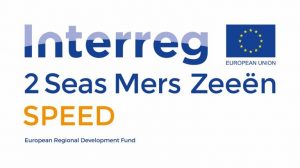SPEED, a European Interreg project, with Bournemouth University as one of its partners, is holding a conference in September aimed at those interested in new technologies (such as smart port applications), business models and ecosystems that can lead to smarter ports.
The TomorrowPorts conference takes place in Antwerp, Belgium from 23-24 September. During the event participants will learn from use cases from smart port pioneers, get inspired by state-of-the-art smart port technologies, find tech talent to fuel the digital transformation, and get in touch with the latest thinking and frameworks. More information and tickets for TomorrowPorts are available here.
SPEED – the Smart Ports Entrepreneurial Ecosystem Development – aims to build an ecosystem for smart port app development in Belgium, France, the Netherlands, and the UK, bridging the gap between the worlds of European ports and the nascent data science – IoT market.
 The conference also provides the opportunity to nominate port solutions for an award to show that collaboration within port ecosystems is key to creating the Smart Ports of Tomorrow. The winner and two runners up are entitled to a money prize, exposure, networking opportunities, free co-working space, and access to the virtual development lab and specific toolkits. The award ceremony will be held at the TomorrowPorts Conference in Antwerp, on Friday September 24. Find out more about the award and on how to register your case here.
The conference also provides the opportunity to nominate port solutions for an award to show that collaboration within port ecosystems is key to creating the Smart Ports of Tomorrow. The winner and two runners up are entitled to a money prize, exposure, networking opportunities, free co-working space, and access to the virtual development lab and specific toolkits. The award ceremony will be held at the TomorrowPorts Conference in Antwerp, on Friday September 24. Find out more about the award and on how to register your case here.
 Research reflections 2022 – Your highlights: The SPEED project
Research reflections 2022 – Your highlights: The SPEED project










 New CMWH paper on maternity care
New CMWH paper on maternity care From Sustainable Research to Sustainable Research Lives: Reflections from the SPROUT Network Event
From Sustainable Research to Sustainable Research Lives: Reflections from the SPROUT Network Event REF Code of Practice consultation is open!
REF Code of Practice consultation is open! ECR Funding Open Call: Research Culture & Community Grant – Apply now
ECR Funding Open Call: Research Culture & Community Grant – Apply now ECR Funding Open Call: Research Culture & Community Grant – Application Deadline Friday 12 December
ECR Funding Open Call: Research Culture & Community Grant – Application Deadline Friday 12 December MSCA Postdoctoral Fellowships 2025 Call
MSCA Postdoctoral Fellowships 2025 Call ERC Advanced Grant 2025 Webinar
ERC Advanced Grant 2025 Webinar Update on UKRO services
Update on UKRO services European research project exploring use of ‘virtual twins’ to better manage metabolic associated fatty liver disease
European research project exploring use of ‘virtual twins’ to better manage metabolic associated fatty liver disease